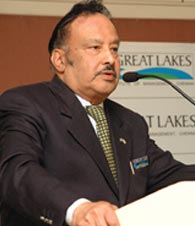|
Executive Interviews: Interview with Bala V Balachandran on Government and Business
December 2009
-
By Dr. Nagendra V Chowdary
-
A lot has been said in the past 12
months about financial sector
reforms. In his speech (September 14,
2009), President Obama called it, “the
most ambitious overhaul of financial
regulatory system since the Great
Depression.” What new financial
regulations have been put in place,
what has been accomplished so far
and what remains to be done as far as
financial reforms go?
The past year has seen a huge focus
on increased regulatory reforms and
inclusion of several mechanisms
such as bonus cap, obscenely high
salaries and forewarning systems etc.
But please note that many can
outsmart the same. Heavy, stringent
and non-lenient punishments
including public humiliation could
serve as deterrents. Only ethical
values and value based education can
effect a significant change which
should start from the home when the
kid is only 3 years old and not in a
business school. I can get an A Plus
Grade in an ethics Course and I can
also be a perfect crook. But that’s not
the objective. A cultural upheaval is
necessary for these reforms to work in
tandem with individual cleansing so
that as a whole the loopholes in any
system are not manipulated to the
advantage of a select few.
-
It’s hard to talk about reform
without talking about the reformers.
Could you help us evaluate the
policies of Treasury Secretary Tim
Geithner and Federal Reserve
Chairman Ben Bernanke? Is there
anything that the regulators could
have done differently?
Both Tim Geithner and Prof. Benanke
who is a colleague of the Nobel
laureate Paul Krugman are strong
minded and passionate with some
compassion. Also to be amazingly
able yet humble is a rare combination.
I think they can do it and have strong
values and commitment. If they
cannot do it, God help the world.
-
A year after the global economic
system collapsed, many companies
are finally finding ways to increase
profits under the new conditions.
However in a recent McKinsey
survey (September 2009) almost as
many expect profits to continue
falling and executives also indicate
that their broader financial hopes
remain fragile. Many expect
government involvement in
economies and industries over the log
term. Should that be the only way
out?
I think the pre 2007 profits are profits
of the past. As I said earlier, the assets
are still there. The balance sheet was
intact except the assets are overvalued
and the liabilities are undervalued.
The income statement therefore has
no sanity. Those who had strong
cash flows will win and will be
profitable. The government will try to
get involved via the stringent
transparency and corporate
governance norms that are in bad
need of repair and overhaul, but the
government is not brilliant either.
Even though the position of CFO at
General Motors has a one million
dollar ticket scaled by government,
they have not been able to find a taker
for the past 2 months. Now there are a
large number of persons whose salary
is proposed to be cut. I think a
reasonable compromise between
willing parties needs to evolve. You
don’t correct a mistake by another
mistake.
-
A powerful tension is at work
today in global economic sentiment.
The financial markets, pundits, and
policy makers think the global
economy is out of the woods, but
executives aren’t so sure. What
should be done in the short term and
in the long term to restore the
confidence and not get sucked up in
such hubris?
The economy has reached its bottom
and now on the upward curve. Is it U
shaped or V shaped? There are
debates and by the time the debate is
over, you will see those who made
quick decisions and exploited the
mess to their advantage will succeed.
The moment one sheep is growing
and enjoying other sheep will follow.
It is now time to think about “money
value of time” and opportunity costs
and not “the time value of money”
and discounted cash flows alone.
This is for the short term. As for the
long term, I personally believe that the
science of economics holds
undisputed sway over the ups and
downs of economic progression.
What goes up must come back down
and I don’t think there is any point in
hoping that the depression won’t
happen again. The only addition that
we see nowadays is that these
economic crests and troughs are
happening in quicker succession
than they used to earlier. Also, the
troughs are rather like heavy falls (one
could debate whether this is actually
brought on by unscrupulous
commercial practices) from which
recovery also takes more time than
earlier. The best advice under the
circumstances would be to expect
this to happen and secure one’s
finances through secure and realistic
instruments and wait out the
depression.
|
